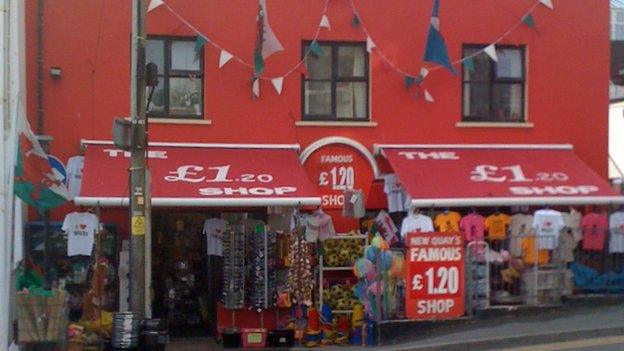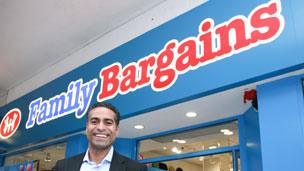Will all pound shops have to raise prices?
- Published

Colin Sharp, founder of the Famous £1 Shop had to change the company's name to Famous £1.20 Shop
Usually it's easy to spot inflation when you're doing your shopping because the prices have gone up.
For one group of retailers that has never been an option, until recently.
In April 2010, Colin Sharp changed the names of his chain of pound shops in Wales from Famous £1 Shop to Famous £1.20 Shop.
He was under pressure from the rising cost of his stock and, although he did not know it, the increase in VAT from 17.5% to 20% would be announced two months later.
People running other pound shops have said that raising the price would kill their business model, but Mr Sharp says he's got away with it.
"People moaned about it at the start but it didn't make the slightest difference - I'm still cheaper than anywhere else," he says.
Colin Sharp started running pound shops in Wales 15 years ago. At the moment he has four of them, having recently converted one of his two stores in Tenby into a picture gallery.
Every year he has a half-price sale in which everything is 60 pence.
He reckons he'll be fine for at least the next five years charging £1.20 for everything.
"It's the way Poundland and 99p stores will have to go in the end," he says.
Sticking to 99p
The co-founder of 99p Stores, whose 173 stores somewhat dwarf Mr Sharp's estate, disputes this.
Like other fixed price retailers, 99p Stores has had to change the quantities it offers because it cannot change the price.

Mr Lalani from 99p Stores started Family Bargains because he could not offer vacuum cleaners for 99p
The Toblerone bars it sells, for example, are now 30g lighter than they were.
"I may be selling a smaller Toblerone than I did 10 years ago, but I am still the cheapest on the High Street for that particular Toblerone," says Hussein Lalani from 99p Stores.
He says his business will not be following Mr Sharp's lead.
"We'll never go down that route. We're sticking to 99p. We understand that's what gets our customers excited," he says.
But 99p Stores has found other ways to escape the pricing strait jacket.
It has recently opened 18 stores in retail parks branded Family Bargains, which are not tied down to a single price.
"We had a lot of customers coming in and saying: 'It's great that you've got all this 99p stuff, but I need to buy a new vacuum cleaner'," Mr Lalani explains, adding that it was an opportunity to take advantage of cheap space becoming available in retail parks.
Also, the company has opened its first stores in the Irish Republic. They are called Euro 50 Stores.
As the name suggests, everything in the stores costs less that one euro 50 cents (£1.25), considerably more than the domestic price-point.
Poundland, which is the industry giant with 381 stores, has opened Deals-branded stores in the Irish Republic and the Isle of Man, which do not stick to a single price, but in the UK it remains the pound shop purist's dream, with nothing costing either more than a pound or less than a pound.
Its retail director, Tim McDonnell is convinced that the pound shop format can survive.
"Poundland has been going for 21 years, but if you look at the model in the States, they've been going for 40 years, so clearly there's longevity in the business," he says.
And what will they be selling in another 20 years?
"If you go into any other supermarket you'll see a whole range of products ranging from 10 pence up to 60 or 70 pence. There are thousands of those lines, and over time, with inflation, they will eventually fall into our price bracket," he says.
- Published15 December 2011
- Published15 December 2011
- Published5 August 2011
- Published18 January 2011